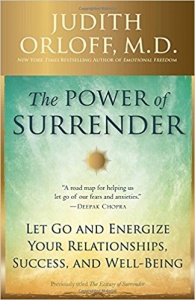Are you an empath? To learn coping skills, get my PDF “Life Strategies for Sensitive People” here.
Surrender is a positive, healthy state. Being a surrendered person does not mean one is beaten down and so hopeless he or she has “given up.” It’s quite the contrary. Surrender is a state of living in the flow, trusting what is, and being open to serendipity and surprises.
 As I write in The Power of Surrender, adopting the behaviors and habits of surrendered people helps us improve our relationships, feel love and gratitude, get healthier, give up destructive people and behavior patterns, and become more successful and influential in our lives and careers. And that’s just the tip of the iceberg as far as benefits go.
As I write in The Power of Surrender, adopting the behaviors and habits of surrendered people helps us improve our relationships, feel love and gratitude, get healthier, give up destructive people and behavior patterns, and become more successful and influential in our lives and careers. And that’s just the tip of the iceberg as far as benefits go.
In my medical practice, I’ve identified specific habits of surrendered people that dramatically enhance their health and allow them to excel in many aspect of their lives. Here are seven of them:
They recognize they can’t control everything.
Being a control freak makes us tense, stressed out, and unpleasant to be with. Surrendered people understand that they can’t always change a situation, especially when the door is shut. They don’t try to force it open. Instead, they pay attention to their own behavior, look at the situation at hand, and find a new, different, and creative way to get beyond the obstacles.
They are comfortable with uncertainty.
Fixating on the outcome or needing to know all the details of an upcoming event, such as a trip, causes people to be upset when things don’t go their way, overly focused on the future, and unable to bounce back easily. Inflexible people are susceptible to anger, distress, and depression. Surrendered people go with the flow, shrug it off when an unplanned situation happens, and tend to be happier, more lighthearted, and resilient.
They remember to exhale during stress.
We have two choices when things pile up at work or we’re surrounded by energy vampires who leave us feeling depleted. We can get frantic, hyperventilate, shut down, and become reactive. Needless to say, these responses to stress just make us more stressed. Surrendered people have the ability to pause, take a deep breath, and observe. Sustaining silence and circumspection are two behaviors that lead to better, healthier outcomes.
They are powerful without dominating.
The most influential person in the room isn’t the one who is being a bully, talking loudly, and imposing him- or herself on others. Surrendered people understand that true power comes from being respectful and listening. Surrendered people know themselves and are empathetic toward others. They don’t measure themselves by how much they are liked, nor do they compete for attention. When they sit quietly in a room, others always seem to come to them.
They feel successful apart from their job or net worth.
Surrendered people enjoy life, relish their personal development, and value their friends. They may have an exceptionally good career and be wealthy, but they are more concerned with meaning and fulfillment. The drive to acquire money and power is a behavior that drains people of their passion and emotional connection to others.
They can admit when they’re wrong.
People who hold on to grudges, insist on being right, and try to change other’s minds have a difficult time maintaining healthy, happy relationships. Surrendered people easily forgive. They are open to new ideas, and aren’t attached to being “right.” As a result, people love working and collaborating with them. Others seek them out as mediators and advisors. They are more laid back and relaxed than their rigid counterparts, which makes them highly valued by others.
They are passionate and emotional.
People who feel the need to push and control tend to keep their feelings bottled up. As a result, they get shut down or remote, and their feelings come out in twisted, unhealthy ways. They become irritable, passive-aggressive, or volatile, for example. Surrendered people make great lovers. They can be spontaneous and playful. They love to feel and express all of their emotions. They look vibrant, healthy, and energetic.
Want to find out how “surrendered” you are? Take a free quiz HERE.
(Excerpt from Dr. Judith Orloff’s national bestseller The Power of Surrender: Let Go and Energize Your Relationships, Success, and Well-Being)



